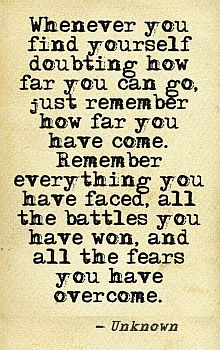I’ve written many times about the long learning curve we face when we decide to become a writer. The journey is always longer than we think because we don’t know what all we don’t know.
I’ve also talked about how it’s hard to label any particular writing skill as beginner or advanced, because we all have different backgrounds, strengths and weaknesses, and learn skills in different orders. Just because we learn a skill later on in our learning curve doesn’t make it advanced.
So how can we track our progress? How can we tell whether we’re improving? How can we feel good about our writing?
Writing Is a Journey and Not a Destination
Before we get into our options for tracking our progress, I want to mention a caveat. While we understandably might want to know where we are in our learning curve, we must also remember that being a writer is a journey and not a destination.
For every skill we master, we’ll probably become aware of another one (or three) where we’re still at the beginner level. And even after we master the majority of writing skills, we constantly have to fight the effects of entropy and sloppiness.
So we don’t want to let our frustrations about the gap between our reality and our goals color our experience too much, or we’ll never experience happiness. There will never be a time when writing will become effortless at every stage, so we can’t allow that to become our goal at all—much less allow ourselves to feel failure or unhappiness at “falling short.”
Rather than tracking our progress to beat ourselves up
about how far we still have to go,
we should instead focus on our progress
to point out to ourselves how far we’ve come.
The Purpose of Tracking Our Progress
I’m going to repeat and emphasize that final point because it’s that important. There’s no such thing as being “done” with our “become a writer” to-do list, so the purpose of tracking our progress is not to see how close we are to that imaginary destination.
Instead, it’s precisely because there’s no concept of “done” or “complete” that we can often despair along our writing journey.
The journey can often feel like we’re going in circles on a Möbius strip. A positive response to a query can make us feel like “Yay! Progress!”—which then can be followed up with a pass, making us feel like we’re back at square one.
For every positive aspect, there’s no guarantee that all our troubles are over. One beta reader can love our work, and another can rip us to shreds. A great contest score or review doesn’t mean they’ll all be like that in the future.
 But those positive events are milestones. Even if they don’t result in forward movement toward publishing success, they’re still accomplishments.
But those positive events are milestones. Even if they don’t result in forward movement toward publishing success, they’re still accomplishments.
They still tell us that we’ve made progress from our starting point. Although we can’t tell how far we have yet to travel to have some measure of success, we can tell how far we’ve come from the start of our journey.
That measurement of what we’ve accomplished and learning is what I mean by “tracking our progress.” Sometimes recognizing that we have come far can make all the difference in holding off our frustration and self-doubt.
Options for Tracking Our Progress
We have many options for tracking our progress along our writing journey—as many as we can think of for our circumstances. This list is but a sampling of what we could come up with.
For each of these, the focus is on recognizing how far we’ve come:
- Have we finished a story when we used to get stuck partway?
- Have we received positive feedback when we used to just get criticism?
- Have we noticed our contest scores improving?
- Have we received a request or an offer from an agent or editor, based on our writing?
- Have we impressed someone whose opinion we value?
- Is the feedback we receive now more encouraging, with faith we can pull it off?
- Have we received positive reviews from readers who don’t know us?
- Have we overcome a deficit in a writing skill to become proficient?
Should We Use a List?
Specific to that last option, we could attempt to create a list of all writing skills possible (adding new ones as we come across them) and crossing each entry off as we receive positive feedback about that aspect of our writing.
(A list to get us started can be found here. Obviously, many of those bullet points contain several topics that would be broken out further.)
That list would never be an end-all-be-all to-do list for becoming a skilled writer (especially as we should constantly be adding to it as we become aware of new skills we’ve yet to master). As I said above, tracking our progress isn’t about seeing how close we are to an imaginary destination.
However, for some of us, the act of checking things off a list can give us a sense of accomplishment. If that’s the case for us, a list recognizing things we’ve learned could help us.
Another Option: Looking at Our Old Writing
Another way of seeing how far we’ve come is to look at our old writing—perhaps a story we never completed or one we set aside months or years ago.
Often, when we look at our old writing, we’ll see mistakes that we’d never make now. Maybe we notice it’s full of telling rather than showing. Or maybe the writing is lacking subtext, or our voice is weak, or our characters are shallow, etc.
Each of those issues proves that we have made progress. We’ve learned better what to avoid or how to make good into great. Each mistake that we can now recognize (and know how to fix) is a skill we can add to our list of accomplishments.
Leveling Up Our Mastery
You’ll notice above that I mentioned a two-pronged aspect to mastery: the ability to find (or identify/recognize) a problem and the ability to fix a problem.
There’s often a difference between those skills. Just because someone can accurately point out an issue in our writing doesn’t mean that their suggested solution is the right way to go. On the other hand, just because someone can tell us how to improve our writing in a certain way doesn’t mean they can point out specifics of where best to apply those fixes.
The same variations can apply to us when it comes to drafting or self-editing. With some writing skills, we might recognize that there is an issue before we learn how to fix it well. And as I discovered this past weekend, with some skills, we might learn how to fix problems before we learn to identify them.
My Experience with Recognizing My Progress
I’ve discussed before how I figured my improving contest scores were a good sign for progress, but those numbers couldn’t tell me how I’d improved. This past weekend, out of random curiosity, I decided to open a file of a trunked novel from years ago.
This was my first original novel, which I’ve called my “learning curve story.” As I learned each new skill, I did yet another editing pass to apply my new knowledge. Because of the countless (no joke—perhaps nearing triple-digits) editing passes, I had this idea in my head that the story wasn’t in bad shape.
That impression was reinforced when I last opened the file about a year ago and still didn’t think it was that bad. Even though I’d had years of writing experience since that first story—and had published my debut novel—I couldn’t recognize my progress in writing quality by looking at that file.
Fast-forward to this past weekend. I opened the file again, once again expecting to see decent-ish writing.
Um, no. *smile*
I only made it a few chapters before I closed the file. The writing is now cringe-worthy to me—and more importantly, I can identify why.
I can now point out the out-of-character phrases, the missing visceral responses, the pacing issues, the lack of emotions, the naming of emotions, etc. In other words, I can now recognize how my writing has improved.
What Changed? How Could I Suddenly See the Problems?
Was it simply the distance of time that allowed me to see the problems? Or was it because of something else?
If we know enough to fix a problem but not enough to identify it (or vice versa), we’ve only partially mastered the skill. A similar issue is when we understand something well enough to do but don’t understand it well enough to explain.
For example, we can often fumble our way through a concept when dealing just with ourselves, but trying to bring someone else up to speed requires a deeper, fuller understanding.
Those problems I found in the story were some of my most recent skills, so I’d learned to draft new material to avoid those issues, but I’d never learned how to find them in old material. In essence, I needed to be able to teach myself how to find the problem before I could even think about self-editing that old story.
So the change of suddenly being able to see the problems that were always there—and yet that I couldn’t see even as recently as a year ago—tells me that I’ve reached a new level of mastery. Thanks to my blog writing and editing experience over the past year, I’ve learned how to teach those skills to others (including myself).
If we’re able to identify improvement in our writing by looking at an old story and comparing it to our current work, we should be proud. Not only do we know the skills involved to better our writing, but we also know how to identify the problems when we come across them in our own familiar work. That’s progress. *smile*
Do you like tracking your progress? What’s your purpose in tracking your writing improvements? What methods have you used for tracking? Have you ever run into the issue of being able to fix problems before you could find them (or vice versa)? How did it affect you?

